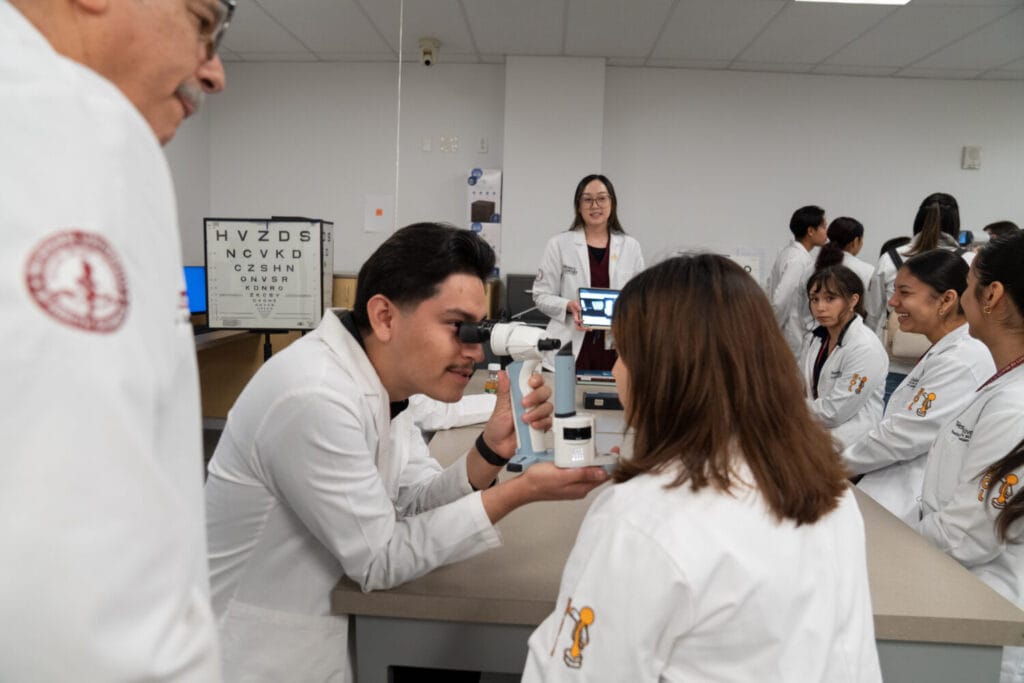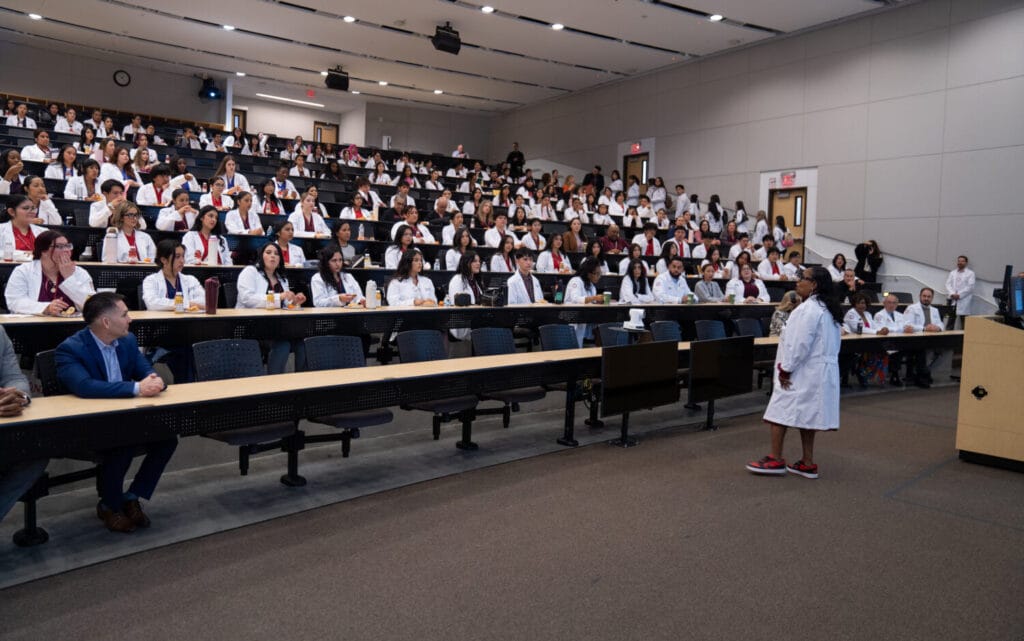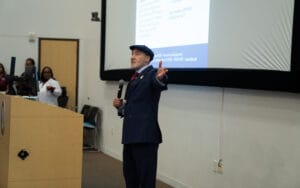
Western University of Health Sciences welcomed nearly 200 high school students from San Bernardino County to Future Health Care Professionals Day, where they received information and inspiration to pursue their dreams of becoming healers.
Each student donned a white coat and rotated through multiple stations, receiving hands-on demonstrations and experiences from WesternU students and faculty on Feb. 4, 2026, on the WesternU California campus. The event was organized by the San Bernardino County Superintendent of Schools and WesternU’s College of Health Sciences.
Future Health Care Professionals Day is a hands-on career exploration event for high school students enrolled in Health Science or Medical Career Technical Education pathways, including programs such as Medical Technology, Patient Care, Sports Medicine, and related health sciences pathways.

WesternU leaders welcomed the students and emphasized that they belong here now and in the future if they choose to apply to WesternU’s programs.
“Please know that the white coat that you’re wearing is the white coat that you can wear, and never lose sight of that. We are here. We welcome you. We’re very excited to have you,” said College of Health Sciences Dean Gail Evans Grayson, EdD, MA. “Make sure you have an opportunity to network and engage and ask those critical questions. There are no dumb questions. There are no simple questions. If you really want to know the intel, ask the questions about how you see yourself here in next five to six years.”

WesternU President Robin Farias-Eisner, MD, PhD, MBA, said the U.S. has a health professional shortage crisis, particularly in primary care, dental health and mental health. WesternU’s colleges directly address these needs.
“That is why we’re here, to expose you to this exciting area of interest. It is a higher calling,” Farias-Eisner said. “You fit in here. You will be here if you want to be here and we want you to know that. We are here to welcome you with open arms and we will make sure that it happens.”
SBCSS Assistant Superintendent of Innovation and Engagement Dr. Stephanie Houston asked her students what they thought of the white coats, and one enthusiastic response was, “Fire.”
“Know this day is for you. Every aspect of today is for you. The team here from this university, they’re here for you. You probably already experienced that today,” she said. “So approach the day with curiosity. Approach the day with an open heart and open spirit and with the value of what this university brings to the community.”
Fontana High School senior Fernanda Vallejo said putting on the white coat made her feel like an adult in the real world. She spoke while attempting suturing techniques taught by College of Podiatric Medicine faculty.
“I feel very inspired to see all the science departments all together,” Vallejo said. “I’m happy to be here.”
Students rotated through various hands-on stations throughout campus. College of Osteopathic Medicine of the Pacific (COMP) students talked about osteopathic medicine and demonstrated Osteopathic Manipulative Medicine (OMM) techniques. COMP student and OMM Fellow Rachel Oshay said informing young students about osteopathic medicine increases the opportunities for more students to come to WesternU.
“It’s really fun to work with teens. They’re so bright, and they have their whole future ahead of them,” Oshay said. “It plants the seed for what can be on other side. It’s a great opportunity.”
All of the high school students who visited WesternU for this program are interested in health careers.
“Our program is one of 400 across the state, California Partnership Academies, as they’re called. Our focus is on diversified health careers, health sciences, and medical technology. We try to expose the kids to as many different career pathways as possible over three years,” said Ami Sandler, AB Miller High School instructor. “Our kids know that this is a great opportunity to connect back with our community and find good employment and gain valuable job skills. I think it’s a great chance for us to learn more about different schools, like WesternU, which some of these kids maybe have never heard of before.”
CHS is introducing a Master of Healthcare Administration (MHA) program in fall 2026. MHA faculty talked about this new program with the students. Mentorship is so important, said Master of Healthcare Administration Assistant Professor Nancy Vargas, PhD, MPH.
“I have benefited from mentorship so much as a first-generation student. I was the first in my family to graduate from middle school, so even in high school, I benefited a lot from community programs and people being there to help me with things like essays,” Vargas said. “It’s very important for people from my community to be in these leadership fields. If I help one person, then they may help other people once they have the skills and they know how to write a resume or essay. I feel it’s very important for the health of our communities, as education is a leading health indicator, and it really leads to better opportunities for, not only students, but their families and their communities at large.”
College of Optometry students demonstrated various optometric tests and procedures. Fourth-year College of Optometry student Jessica Tum led an activity with the handheld slit lamp to look at the health of the front and back of the eye.
“This is a way to help students get their foot in the door. Sometimes they’re at a point where they don’t really know what to do yet. I feel like putting yourself out there and really getting yourself into these experiences helps open your mind to figure out what you like, what you don’t like, and just to get a better idea of what you want to do,” Tum said. “I really enjoyed working with the students and helping them. The main thing here that I was trying to discuss with the students is that not only do optometrists help prescribe glasses, but we also help treat and diagnose diseases. Sometimes we are the first doctors or point of contact to actually diagnose the health condition that they may not know they have.”
Visiting students learned about potential career paths via the College of Pharmacy, the Master of Science in Medical Sciences program and the College of Graduate Nursing, which invited students into the Nursing Simulation Center for hands-on demonstrations with manikins. Department of Physician Assistant Education faculty demonstrated suturing and the students listened to heart and lung sounds on student auscultation manikins.
“Today has been super cool. I like the campus, it’s so pretty, and I love the fact that you have dogs on campus. I really liked that the class we just went to was really hands on. We were able to learn how to do certain things, which is really cool,” said AB Miller High School student Amber Alcantar, who is interested in becoming an Applied Behavior Analysis Therapist and working with children with disabilities. “I’ve also enjoyed the team bonding activities we’ve done. It was fun for us, as students, to work together and we’ve been able to learn more. I find it easier to learn if I’m visualizing something, seeing it, and if I’m able to actually do it.”